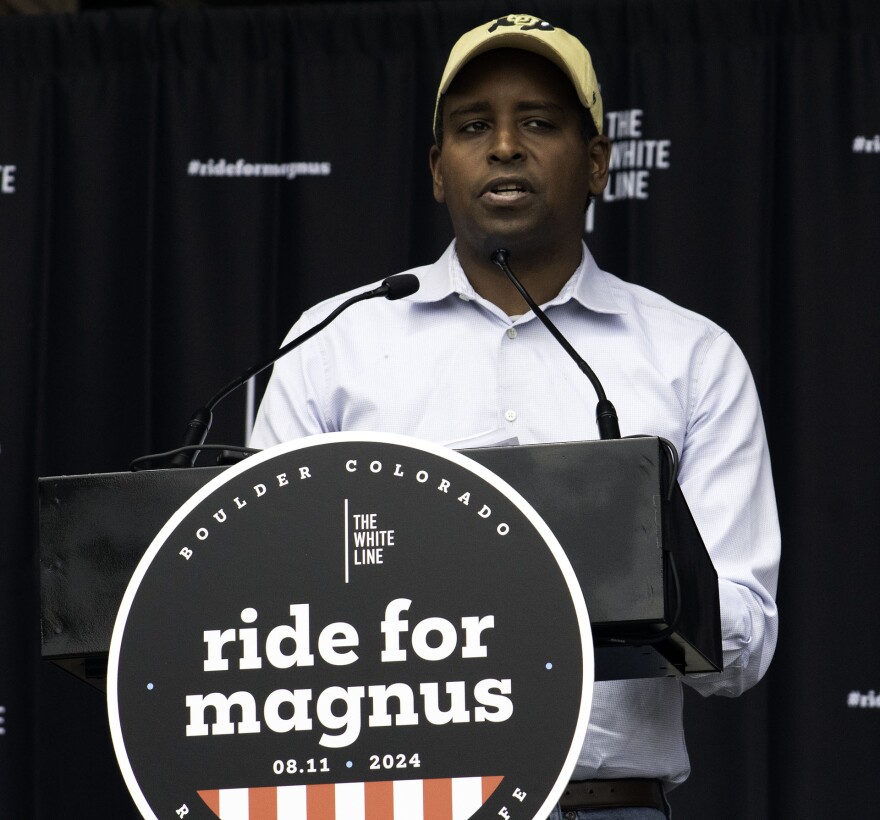Michael White described his son Magnus’ final moments in vivid detail to a hushed crowd on CU Boulder’s Farrand Field on Sunday.
“My honey’s head was so swollen, it was unrecognizable. And that’s when I knew the ending,” he said.
“Sanitizing what really happens to those in road violence deaths only contributes to it happening again and again.”
Magnus White was hit last summer by an allegedly fatigued driver on Highway 119 near Boulder. He was 17 years old and a rising junior star on the USA National Cycling Team. His death spurred a wave of media attention and an outpouring of calls for improved bike safety infrastructure.

On Sunday morning, riders of all ages mounted everything from high-end road bikes to rickety single speeds for a memorial ride from the CU Boulder campus to the site of White’s death and back.
According to organizers, 2,087 cyclists joined the miles-long peloton. Another 672 riders joined the ride virtually, and 158 attendees participated in a walking route.
“It’s a big showing of our community rallying around one of our fellow community members and trying to make a positive impact for his legacy,” Superior resident and avid cyclist Megan Finnigan told KUNC.
After the ride, White’s parents spoke to the crowd at Farrand Field.
Jill White, Magnus’s mother, urged the community to see her son's death as a call to action.
“Here’s the truth we must face, and I hate saying this,” she told the audience. “We know what killed Magnus, and we know the solutions.”

In his speech, Michael White outlined specific local, state, and federal policy requests. Gov. Jared Polis and Rep. Joe Neguse joined him on stage. At times, he addressed the politicians directly.
At a local level, White called for lawmakers to fast-track . The road accounted for 30% of severe and fatal bike and pedestrian accidents in unincorporated Boulder County between 2009 and 2018, according to the county.
“We are pushing this to be complete by 2029,” White said. “Five years, not 16 years like the road Magnus was killed on. It is outrageous, it is immoral, the time it takes to build traffic safety infrastructure in Colorado.”
Boulder County Commissioners voted to adopt a feasibility report on the bikeway prepared by county staff .
White asked state lawmakers to pass legislation requiring stricter penalties for drivers convicted of careless driving and vehicular homicide. Currently, .
Earlier this year, Polis signed a bill into law that directed the Transportation Legislation Review Committee to review penalties for “offenses related to driving a vehicle.” The committee will meet about it this Friday. White plans to speak in favor of harsher sentences at the meeting.
“We don’t want to put more people in jail — we see it as a deterrent.” He told the crowd on Friday. “The threat of severe penalties will force people to drive more responsibly.”
Yeva Smilianska, the driver who hit Magnus White, pled not guilty to vehicular homicide in May. She will the week of Dec. 16.
At a federal level, White asked that lawmakers pass new legislation requiring new vehicles to have automatic emergency braking systems (AEB) sensitive to bicycles and motorcycles starting in 2029. The National Highway Traffic Safety Administration covering AEB and pedestrians but it does'nt include language about bicycles.
White got an immediate response to his request from Neguse..
“To Michael and Jill, I will simply say that I hear you and that we look forward to introducing legislation to make automatic braking technology for bicyclists and motorcyclists a reality in the United States Congress,” he said.
“You have my commitment that we will do that.”

Organizers of Sunday's memorial ride shared links to form emails that can be sent to policymakers. They also promoted a petition with their policy requests on . On Sunday, event volunteers handed out QR codes to direct attendees to the site.
By all measures, the ride was a success for bicycle safety advocates. It gathered thousands of community members and led to commitments from local, state, and federal elected officials.
Yet, it was bittersweet for Jill and Michael White.
“All this is happening at the same time as we’re dealing with the pure grief of losing our son,” Michael White told KUNC.
“Dealing with that, compounded with planning something for thousands of people, it’s mentally and emotionally taxing.”
At times, the grief is overwhelming.
“There’s days that I do stay in bed, especially Saturdays, the day Magnus was killed,” Jill said. “My body remembers, and sometimes I just can’t move.”

The Whites have been the driving force behind Sunday’s event for five months. They met with policymakers, submitted to interviews with journalists and documentarians, printed out race numbers, and wrote speeches.
They're motivated by their outrage at an infrastructure and legal system that they see as having contributed to Magnus’ death.
“I’m Magnus’ Dad. I’ll always be Magnus’ Dad,” White told the crowd on Sunday. “Please don’t let him die in vain.”
This story is funded by the Neil Best Fellowship, a six-month program designed to engage talented students from local colleges and universities. For this fellowship, Gabe Allen is focused on expanding the station's presence on emerging platforms to reach broader and more diverse audiences.



